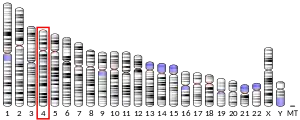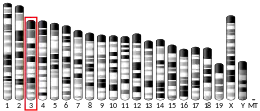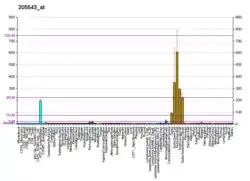| HSPA4L | |||||||||||||||||||||||||||||||||||||||||||||||||||
|---|---|---|---|---|---|---|---|---|---|---|---|---|---|---|---|---|---|---|---|---|---|---|---|---|---|---|---|---|---|---|---|---|---|---|---|---|---|---|---|---|---|---|---|---|---|---|---|---|---|---|---|
| Identifiers | |||||||||||||||||||||||||||||||||||||||||||||||||||
| Aliases | HSPA4L, APG-1, HSPH3, Osp94, heat shock protein family A (Hsp70) member 4 like, APG1 | ||||||||||||||||||||||||||||||||||||||||||||||||||
| External IDs | MGI: 107422 HomoloGene: 22610 GeneCards: HSPA4L | ||||||||||||||||||||||||||||||||||||||||||||||||||
| |||||||||||||||||||||||||||||||||||||||||||||||||||
| |||||||||||||||||||||||||||||||||||||||||||||||||||
| |||||||||||||||||||||||||||||||||||||||||||||||||||
| |||||||||||||||||||||||||||||||||||||||||||||||||||
| |||||||||||||||||||||||||||||||||||||||||||||||||||
| Wikidata | |||||||||||||||||||||||||||||||||||||||||||||||||||
| |||||||||||||||||||||||||||||||||||||||||||||||||||
Heat shock 70 kDa protein 4L is a protein that in humans is encoded by the HSPA4L gene.[5][6]
References
- 1 2 3 GRCh38: Ensembl release 89: ENSG00000164070 - Ensembl, May 2017
- 1 2 3 GRCm38: Ensembl release 89: ENSMUSG00000025757 - Ensembl, May 2017
- ↑ "Human PubMed Reference:". National Center for Biotechnology Information, U.S. National Library of Medicine.
- ↑ "Mouse PubMed Reference:". National Center for Biotechnology Information, U.S. National Library of Medicine.
- ↑ Nonoguchi K, Itoh K, Xue JH, Tokuchi H, Nishiyama H, Kaneko Y, Tatsumi K, Okuno H, Tomiwa K, Fujita J (Nov 1999). "Cloning of human cDNAs for Apg-1 and Apg-2, members of the Hsp110 family, and chromosomal assignment of their genes". Gene. 237 (1): 21–8. doi:10.1016/S0378-1119(99)00325-X. PMID 10524232.
- ↑ "Entrez Gene: HSPA4L heat shock 70kDa protein 4-like".
Further reading
- Nonoguchi K, Tokuchi H, Okuno H, Watanabe H, Egawa H, Saito K, Ogawa O, Fujita J (2001). "Expression of Apg-1, a member of the Hsp110 family, in the human testis and sperm". Int. J. Urol. 8 (6): 308–14. doi:10.1046/j.1442-2042.2001.00304.x. PMID 11389747. S2CID 27280317.
- Matsumori M, Itoh H, Toyoshima I, Komatsuda A, Sawada K, Fukuda J, Tanaka T, Okubo A, Kinouchi H, Mizoi K, Hama T, Suzuki A, Hamada F, Otaka M, Shoji Y, Takada G (2003). "Characterization of the 105-kDa molecular chaperone. Identification, biochemical properties, and localization". Eur. J. Biochem. 269 (22): 5632–41. doi:10.1046/j.1432-1033.2002.03272.x. PMID 12423363.
- Colgan SP, Pitman RS, Nagaishi T, Mizoguchi A, Mizoguchi E, Mayer LF, Shao L, Sartor RB, Subjeck JR, Blumberg RS (2003). "Intestinal heat shock protein 110 regulates expression of CD1d on intestinal epithelial cells". J. Clin. Invest. 112 (5): 745–54. doi:10.1172/JCI17241. PMC 182184. PMID 12952923.
- Ewing RM, Chu P, Elisma F, Li H, Taylor P, Climie S, McBroom-Cerajewski L, Robinson MD, O'Connor L, Li M, Taylor R, Dharsee M, Ho Y, Heilbut A, Moore L, Zhang S, Ornatsky O, Bukhman YV, Ethier M, Sheng Y, Vasilescu J, Abu-Farha M, Lambert JP, Duewel HS, Stewart II, Kuehl B, Hogue K, Colwill K, Gladwish K, Muskat B, Kinach R, Adams SL, Moran MF, Morin GB, Topaloglou T, Figeys D (2007). "Large-scale mapping of human protein-protein interactions by mass spectrometry". Mol. Syst. Biol. 3 (1): 89. doi:10.1038/msb4100134. PMC 1847948. PMID 17353931.
External links
- HSPA4L+protein,+human at the U.S. National Library of Medicine Medical Subject Headings (MeSH)
This article is issued from Wikipedia. The text is licensed under Creative Commons - Attribution - Sharealike. Additional terms may apply for the media files.




